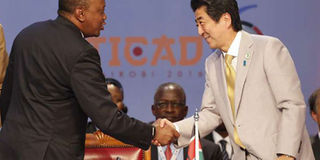Conferencing next frontier in our tourism

President of Kenya Uhuru Kenyatta (left) and Japanese Prime Minister Shinzo Abe shake hands during the closing session of Ticad VI in Nairobi on August 28, 2016. Kenya has become a choice destination and we have registered high growth in the number of delegates attending international conferences here. FILE PHOTO
What you need to know:
- Kenya has done well in the past three years despite grappling with several terrorist attacks.
- Conference tourism, though a niche market, is a sensitive industry.
The last time Kenya hosted a large delegation of presidents and heads of government was in 1981, when the Organisation of African Unity, the predecessor of the African Union, held its annual June summit in Nairobi. Kenya welcomed 31 African leaders.
Some 35 years later, we have broken that record, hosting the recent Tokyo International Conference on Africa’s Development (Ticad), which brought together 35 African heads of state and government and more than 10,000 delegates.
This was the first time that the Ticad conference was held outside Japan and the choice of Kenya was a statement that we have come of age and can now host high-profile meetings.
This has given us much-needed publicity in Japan, a prospective reservoir for our tourism.
Such conferences are significant because the world has become a riskier place. Over the years, tourism destinations — from London to Paris, Brazil to Istanbul — have come under immense pressure and people are much more wary of their security.
Kenya has done well in the past three years despite grappling with several terrorist attacks.
Last year, the country hosted a sitting president of the United States, Barack Obama, and later Pope Francis in November.
Kenya has also hosted several other high-profile meetings — the World Trade Organisation’s ministerial conference, the United Nations Conference on Trade and Development (Unctad) meeting, the Global Entrepreneurship Summit, and the World Public Relations Forum.
What can we read from this? After several years of conference tourism misery, investors have reason for hope.
Kenya has become a choice destination and we have registered high growth in the number of delegates attending international conferences here.
The number has grown from 40,109 delegates in 2014 to 77,848 in 2015, and we expect to break a new record in 2016.
NEW MARKET
That should not be taken lightly. Conference tourism, though a niche market, is a sensitive industry. We can exploit it because it revolves around service provision to business travellers attending seminars, workshops, conferences, and conventions.
It has a higher financial impact because conference travellers spend more than the leisure ones.
The ongoing upgrading of and increase in the number of conference facilities is paying dividends and we are now able to provide more accommodation and bed capacity.
That is also the reason we are upgrading our transport, security, and communication infrastructure.
Any visitor to Jomo Kenyatta International Airport is now able to see these changes and once the construction of the standard gauge railway is complete, Nairobi and Mombasa will be connected through reliable and fast rail transport.
Nairobi is now regarded as among the world’s best destinations for international conferences.
This gives us a chance to not only market Kenya internationally, but to get much-needed publicity.
It is because of how we have dealt with some of our challenges and our hospitality that we have become a destination of choice.
KENYA'S RESILIENCE
Both the government and businesses have stepped up to improve security.
We have devised marketing strategies to persuade tourists to return, sometimes using the same social media that amplified our crisis in the first place.
Despite many challenges, we are still ranked high for our natural and cultural resources and our positive business environment.
We have overcome travel restrictions. The positive messaging has helped to trigger a minor rebound for this country.
We are creating more products to complement our traditional “wildlife, sun, and sand” packages. These new packages include regional and international conferences.
Mr Balala is the Cabinet secretary for Tourism.




